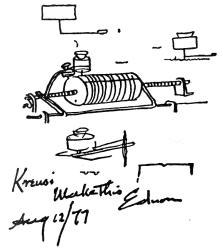|
Edison's
mind from early youth was always filled with ideas. He
was always looking for better ways to do the job. But he had more than
ideas. He had a desire and ability to put them into physical form and
try them out. But this experimenting cost money, and the minute young
Tom would get hold of a few dollars, it went into apparatus and
equipment.
But it wasn't long before his experiments bore fruit. He redesigned the clumsy stock ticker of that day and sold the improved machine for $40,000, a fortune then. To Edison it meant only that he could spend more time and money in research. By the time he was 30 he had become a professional inventor. He had more ideas than he could complete by himself, so he set up a laboratory at Menlo Park in New Jersey and employed some assistants to help him work on the many unknown details.  This procedure of Edison's is probably the first time
in history that an organized group was used to investigate a problem.
The lone inventor was being replaced by organized research. The Menlo
Park Laboratories were moved to Dearborn, Michigan under Mr. Edison's
supervision where it is now a part of the great Ford Museum. Out of
this laboratory came the telephone transmitter, the phonograph, the
incandescent lamp and the motion picture.
This procedure of Edison's is probably the first time
in history that an organized group was used to investigate a problem.
The lone inventor was being replaced by organized research. The Menlo
Park Laboratories were moved to Dearborn, Michigan under Mr. Edison's
supervision where it is now a part of the great Ford Museum. Out of
this laboratory came the telephone transmitter, the phonograph, the
incandescent lamp and the motion picture. |








